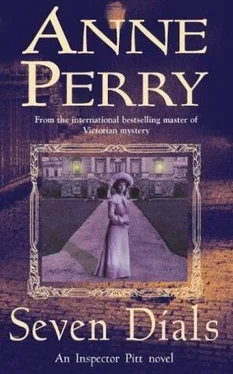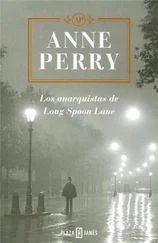“Then if ’e’s in that much trouble she’s right ter be worried-in’t she?” she said triumphantly.
Tellman let out his breath in a long sigh. “Worried, yes, but calling in the police, definitely not.”
Gracie clenched her fists by her sides in an effort to hang on to the last shred of her temper. “She in’t callin’ in the police, Samuel! She told me, an’ I’m askin’ you. You in’t police, yer me friend. Leastways, I thought yer was. I’m askin’ yer ’elp, not tryin’ ter start a case.”
“What do you expect me to do?” His voice rose in indignation at the sheer unreasonableness of it.
She bit back her response with a mighty effort and forced herself to smile at him with the utmost sweetness. “Thank yer,” she said charmingly. “I knew yer’d ’elp, when yer understood. Yer could start by askin’ Mr. Garrick ’isself where Martin is. Yer don’t ’ave ter say why, o’ course. Mebbe ’e were a witness?”
“To what?” His eyebrows shot up in disbelief.
She ignored it. “I dunno! Think o’ summink!”
“I can’t use police authority to go and question someone over something I invented!” He looked offended, as if his morality had been insulted.
“Oh, don’ be so… so…” She was almost lost for words. She loved him as he was, stiff, awkward, full of indignation, covering his compassion with regulations and habit, the rigidity he had been taught, but sometimes he infuriated her beyond endurance, and this was one of those times. “Can’t yer see beyond the end o’ yer nose?” she demanded. “Sometimes I think yer brain is shut inside yer book o’ rules! Can’t yer see that lives, feelin’s, wot’s inside people’s wot matters?” She drew in breath and went on. “People are ’eart an’ blood, an’… an’ mistakes an’ things. An’ dreams! Tilda needs ter find wot ’appened to ’im… an’ that’s real!”
His face hardened. He clung on to what he understood. “If you break the rules, in the end they’ll break you,” he said stubbornly, and in that instant she knew she had lost him. He had made a statement he could not go back on. He was right as he saw it, and she understood more than she could now admit. She had been unfair, forgetting he was working for Wetron now, not Pitt, and there would be no latitude granted him for anything. He had already risked his job once to save her and Charlotte and the children, and done it without thought of himself. Another day, when she was not so angry, and when it would not look like either apology or trying to win him back, she would tell him so. Just at the moment her thoughts were centered on Tilda and what had happened to her brother.
“Well, if yer won’t ’elp ’er, I’ll ’ave ter do it misself!” she said at last, swinging around to move a step away from him. She could not think of anything cutting and final to say, which was very frustrating. All she could do was stand and stare for a moment, as if she were about to deliver the final blow, then let out a sigh and leave.
“No, you won’t!” Tellman said abruptly. “You’ll do nothing of the sort!”
She spun around to face him again. “Don’t you tell me wot ter do, Samuel Tellman! I’ll do wot I ’ave ter, an’ you don’t ’ave nothin’ ter say about it!” she shouted, but she felt so much better that he had responded.
“Gracie!” He took a long stride after her as if he would reach out and grasp her arm.
She shrugged exaggeratedly and did a little skip to elude him, and then walked as quickly as she could without looking back, mostly because she wanted to think he was staring after her, perhaps even following her, and she did not want to find out that he was not.
When she reached Keppel Street and went in through the scullery to the kitchen, she was still just clinging on to anger, but unhappiness had almost drowned it out. She had not handled the encounter with Tellman well. Even if she could not have persuaded him to investigate Martin Garvie’s disappearance, and just possibly he had something of an honest reason for not doing so, at least she could have behaved so that they parted friends. Now she had no idea how to retrace it so she could speak openly to him next time they met. It was amazing how sharply that hurt her. She had not expected it to matter as deeply as it did. One day quite soon she was going to have to face the fact that she cared for him very much.
Fortunately there was no one else in the kitchen, so she could blow her nose and wash her face quickly, and then try to look as if nothing were wrong. She had the kettle on when Charlotte came in.
“Would yer like a cup o’ tea?” she asked almost cheerfully.
“Yes, please,” Charlotte accepted, in spite of the fact that it was only half past six. She sat down at the table and made herself comfortable. “What’s wrong?” she asked, waiting motionlessly as if demanding an answer.
Gracie hesitated for a moment, debating whether to say that there was nothing wrong or to tell her at least part of it-the bit about Martin Garvie. She had not realized that Charlotte could read her so well. That too was a little disconcerting. And yet they had known each other for so long that if Charlotte had not ever hurt her, it would mean she did not care, and that would have been worse.
“Saw Tilda Garvie this mornin’,” she replied, banging the lid onto the tea caddy unnecessarily hard and keeping her back to the table. “She in’t seen ’er brother fer days, an’ she’s real worried summink’s wrong.”
“What sort of something?” Charlotte asked.
The kettle began to whistle and Gracie put her hand around the pot holder as she lifted it off the hob. She scalded the teapot, pouring the water down the sink, then put the leaves in and filled it from the kettle. She could no longer find any excuse for not sitting down, so she did so stiffly, avoiding meeting Charlotte’s eyes.
“ ’E in’t livin’ in the ’ouse in Torrington Square where ’e worked,” she answered, “an’ the butler says ’e don’t work there no more, but ’e din’t tell ’er wot ’appened or where ’e went.” She had not intended to look at Charlotte, but suddenly the reality of Martin’s situation outweighed her own pride. “An’ if things was all right ’e wouldn’t do that, ’cos they’re real close,” she went on hurriedly. “They got nob’dy else. Wotever’d ’appened, ’e’d ’a told ’er, ’specially since ’e missed ’er birthday, an’ ’e in’t never ever done that before.”
Charlotte frowned. “What did he do at the house in Torrington Square?”
“Valet ter Mr. Stephen Garrick,” Gracie replied immediately. “ ’E weren’t just a footman or the like. An’ Tilda said Mr. Garrick relied on ’im. I know people can get throwed out easy enough if they do summink daft, or even if it jus’ looks like they did, but why couldn’t ’e ’a said summink ter Tilda? Just ter keep ’er from worryin’.”
“I don’t know,” Charlotte said thoughtfully. She reached over and poured the tea for both of them, then replaced the pot on the trivet. “It does sound as if he was very distressed about something, or he would surely have told her he was moving. He may even have found a better position. Can Tilda read?”
Gracie looked up, startled.
“Well, it would be harder to send her a letter if she can’t,” Charlotte reasoned. “Although I suppose somebody would read it for her.”
Gracie felt the sinking feeling inside her grow worse. She was hollow, and yet the thought of eating was repellent. She sipped her tea, and its hot sweetness slid down her throat and made no difference.
“What else?” Charlotte asked gently.
Gracie still hesitated. There was a kind of comfort in being so well understood, but she was still embarrassed to have been so incompetent in dealing with Tellman. It was made worse by the fact that she had always done it so well before. Charlotte would expect better of her than this. She would be disappointed in her. Women were supposed to be cleverer than she had been. She sipped her tea again. It was really too hot. She should have waited.
Читать дальше












